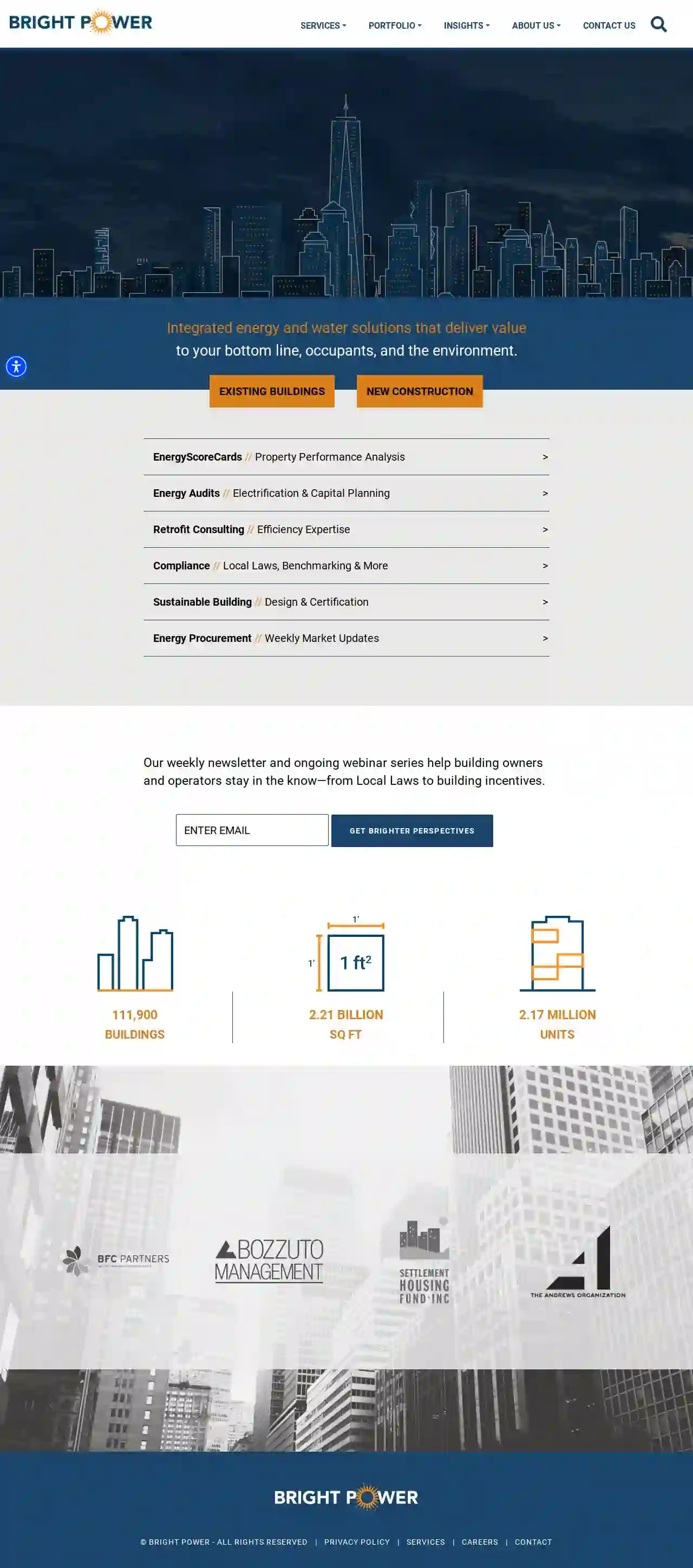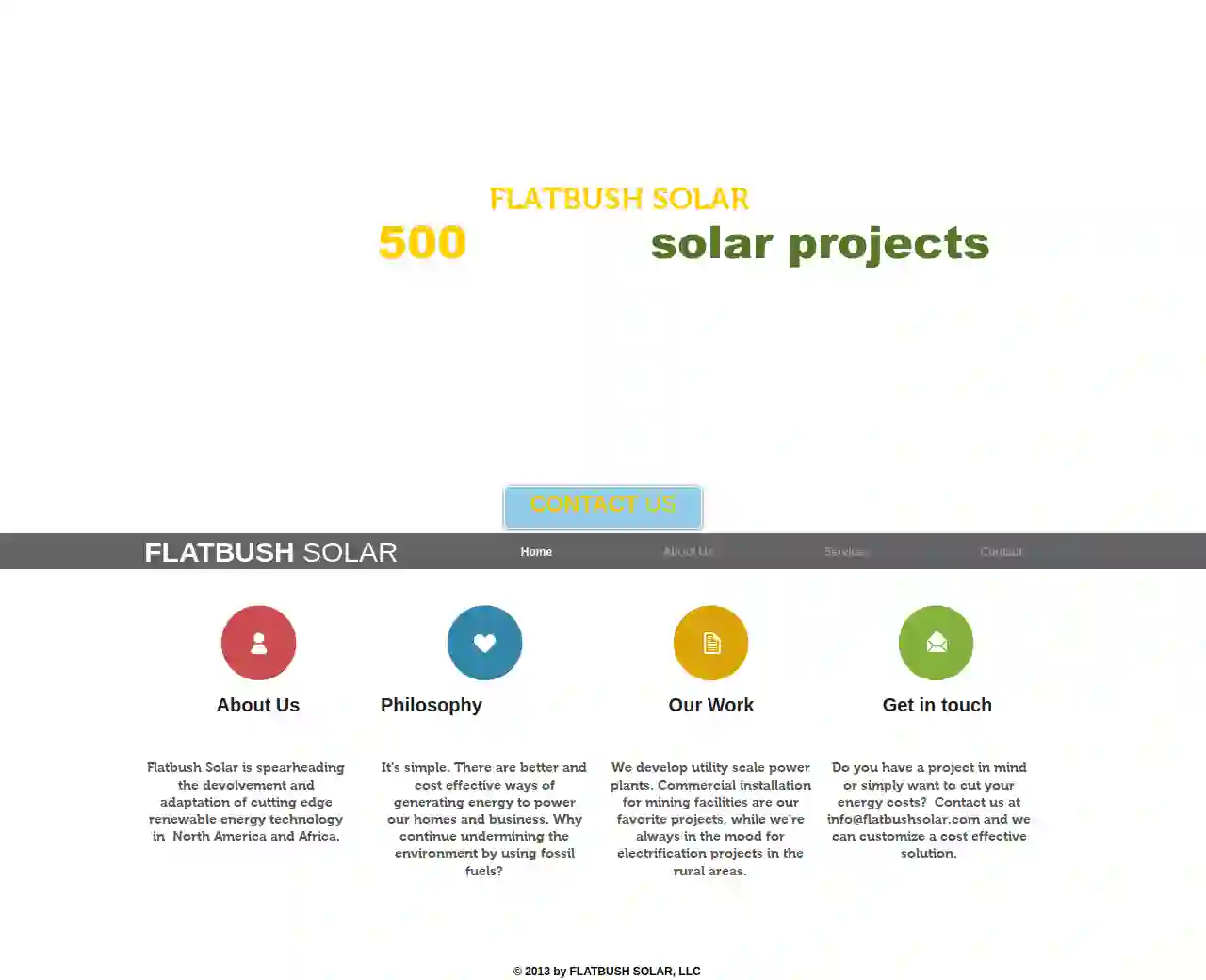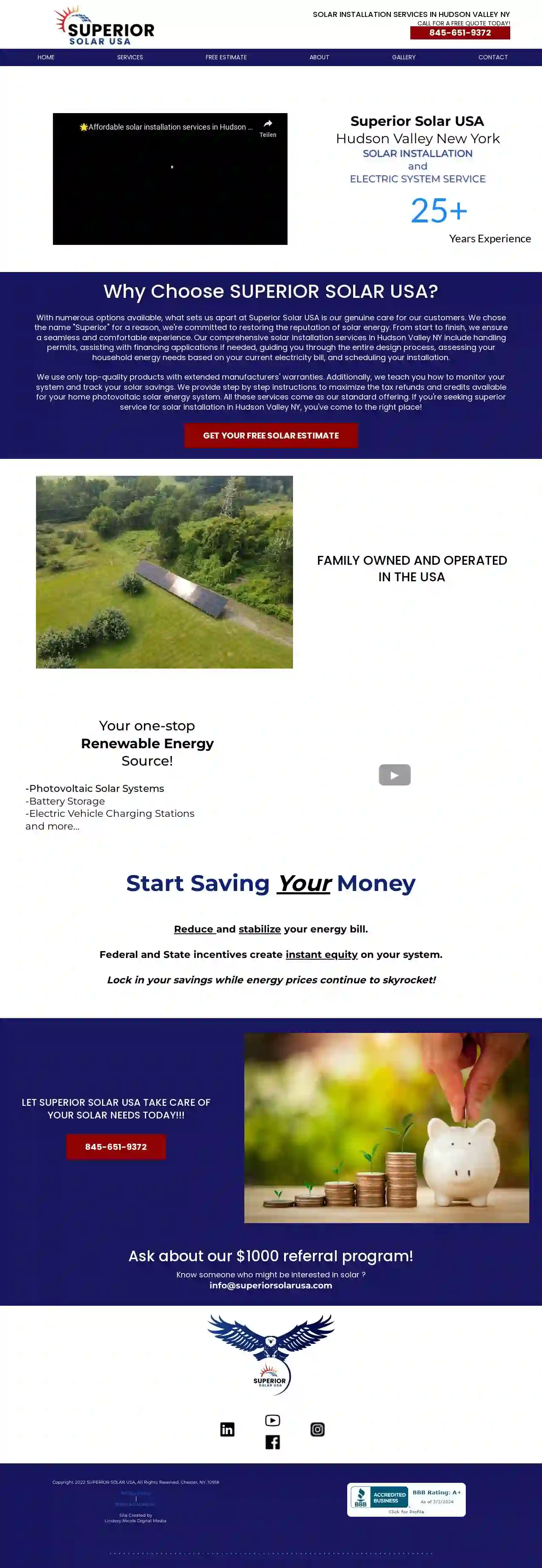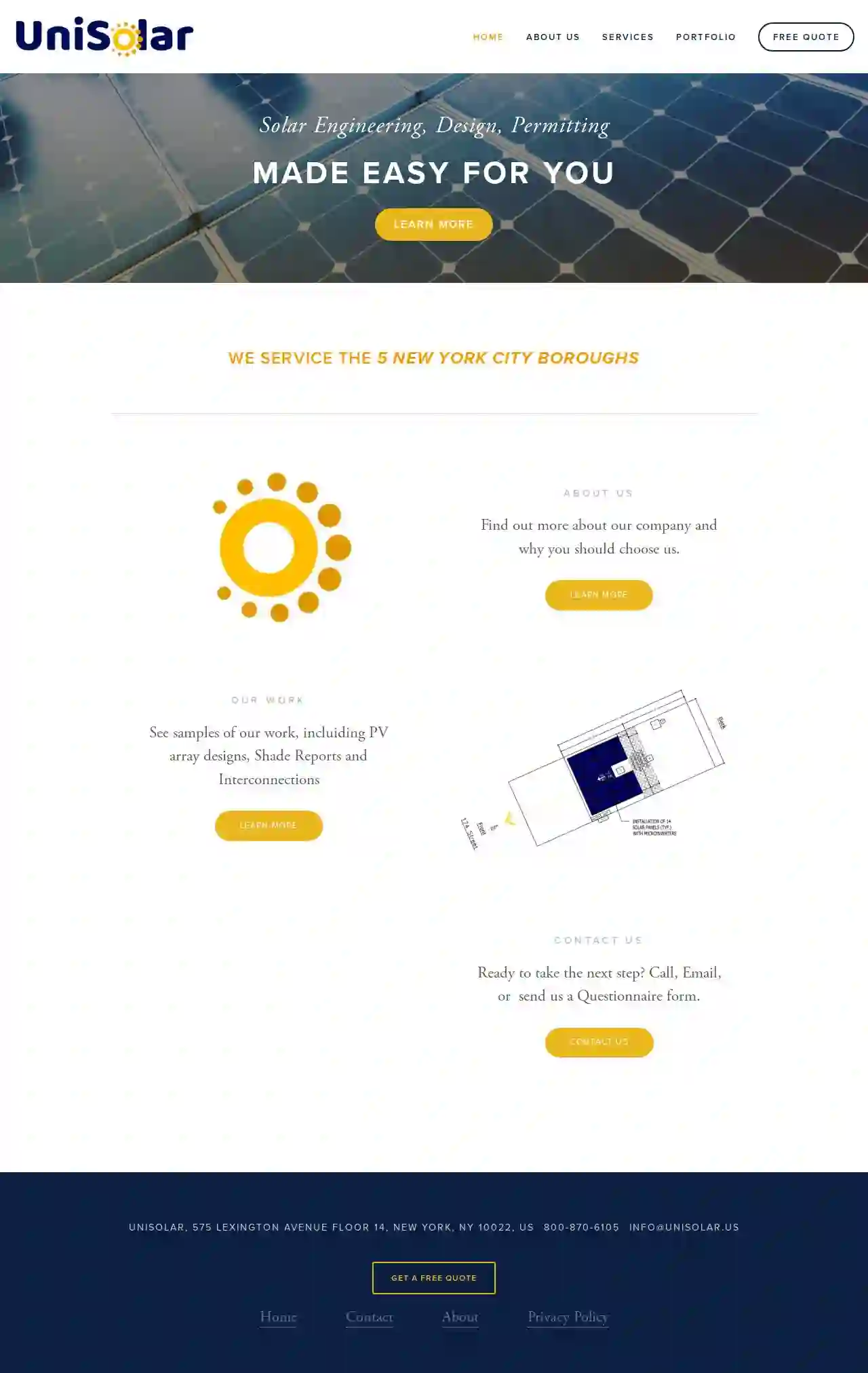Commercial Solar Installers Scranton
Find top Commercial Solar Companies in Scranton
Get multiple Solar Panels For Businesses quotes for your project today! Compare profiles, reviews, accreditations, portfolio, etc... and choose the best service.

Fusion Solar Energy
4.332 reviewsEdison, NJ, 1059 King Georges Post Road, 08837, USAt Fusion Solar Energy, we believe in the power of clean, renewable energy to transform lives and communities. Founded with a vision to make sustainable energy accessible and affordable for all, we are dedicated to providing innovative solar solutions that empower individuals, businesses, and organizations to embrace a greener future.
- Services
- Why Us?
- Accreditations
- Our Team
- Testimonials
- Gallery
Get Quote
Bright Power
3.337 reviewsNew York, NY, USA, 123 Broadway, 10001, USBright Power is a leading provider of energy and water management solutions, offering comprehensive services including ongoing energy management, benchmarking, compliance with energy laws, energy supply purchasing, and more. With a focus on sustainability and value, Bright Power helps building owners and operators navigate the complex world of energy and water management.
- Services
- Why Us?
- Accreditations
- Our Team
- Testimonials
- Gallery
Get Quote
Onyx Solar Group LLC
C/ Río Cea 1, 46, Ávila, 05004, USOnyx Solar is the world’s leading manufacturer of transparent photovoltaic (PV) glass for buildings. Onyx Solar uses photovoltaic glass as a material for building.
- Services
- Why Us?
- Accreditations
- Our Team
- Testimonials
- Gallery
Get Quote
PowerLutions Solar
51 reviewsLakewood, NJ, 216 River Avenue, 08701, USPowerLutions Solar Company is a NABCEP Certified-Led, full service solar installer in NJ, NY, FL, CT & MA. They offer a 1:1 project experience, overseen by one of their dedicated solar specialists. Their services include residential and commercial solar solutions, solar installation, solar financing, and more. They are authorized and recognized by several organizations and offer solar incentives to their customers.
- Services
- Why Us?
- Accreditations
- Our Team
- Testimonials
- Gallery
Get Quote
Solar Living Inc.
5111 reviewsP.O. Box 1174, Fair Lawn, 07410, USSolar Living, Inc. has been providing service, design, and installation of solar thermal pool heating and domestic hot water systems in the New York, New Jersey, and Pennsylvania area continuously since 1977. They stand behind every product they manufacture, sell, and install, and provide comprehensive warranties to all their customers, on both parts and labor.
- Services
- Why Us?
- Accreditations
- Our Team
- Testimonials
- Gallery
Get Quote
FLATBUSH SOLAR, LLC
York, USFlatbush Solar is a leading developer of renewable energy technology in North America and Africa. They specialize in utility-scale power plants, commercial installations for mining facilities, and rural electrification projects. Their mission is to provide cost-effective energy solutions while promoting environmental sustainability.
- Services
- Why Us?
- Gallery
Get Quote
CVE North America
51 reviews123 Main St, Suite 100, Cityville, 12345, USCVE North America is an independent power producer, delivering clean, renewable energy to our customers. We develop, finance and build solar plants to own and operate for the long term. Our relationship with landowners and local governments is paramount, as we work together to bring clean energy to local households and businesses. Our solar solutions include ground mounted solar, solar rooftops, solar solutions for farmers, Halo Community Solar, and solar carports. We are committed to sustainability and fostering positive societal values beyond the environmental benefits of our projects.
- Services
- Why Us?
- Accreditations
- Our Team
- Testimonials
- Gallery
Get Quote
Superior Solar USA
523 reviewsChester, NY, 123 Main St, 10918, USSuperior Solar USA is a trusted solar expert in Hudson Valley, NY, delivering efficient and affordable solar solutions to homeowners. They handle everything from permits to financing, design to installation, using top-quality products with extended warranties. Their services include residential and commercial solar panel systems, battery storage and generators, electric vehicle charging stations, and more. They offer various benefits such as environmental benefits, reduction of energy bills, stability on energy bills, and immediate return on investment.
- Services
- Why Us?
- Accreditations
- Our Team
- Testimonials
- Gallery
Get Quote
Emes Solar
54 reviewsWoodmere, NY, 123 Solar Street, New York, 11598, USEmes Solar is a company focused on change, aiming to provide affordable, clean, and intelligent energy to communities. They install high-quality solar panels and treat clients with Honesty, Integrity, and Quality. Emes Solar offers various services including residential and commercial solar installations, solar generators, and financing options. They operate in multiple states and have completed numerous projects.
- Services
- Why Us?
- Accreditations
- Our Team
- Testimonials
- Gallery
Get Quote
UniSolar
51 reviewsNew York, NY, 575 Lexington Ave. Fl. 14, 10022, USUniSolar is a leading provider of solar engineering, design, and permitting services. Our team of experts is dedicated to making the process easy for our clients. We service the 5 New York city boroughs and offer a range of services including PV array designs, shade reports, and interconnections. Our goal is to provide high-quality services that meet our clients' needs and exceed their expectations.
- Services
- Why Us?
- Accreditations
- Our Team
- Testimonials
- Gallery
Get Quote
Over 4,210+ Solar Installers registered
Our solar installers operate in Scranton & surroundings!
SolarCompaniesHub has curated and vetted Top Solar Installers in and around Scranton. Find the most trustworthy business today.
Frequently Asked Questions About Commercial Solar Installations
- Full Retail Net Metering: The most favorable policy, where you receive full retail credit for excess solar energy sent to the grid. This means you get the same price for the electricity you sell back as you pay for the electricity you buy from the utility.
- Time-of-Use (TOU) Net Metering: The value of the credits you earn varies depending on the time of day you export electricity to the grid. Higher credits are typically offered during peak demand periods.
- Net Billing: You receive a lower rate for excess solar energy than the retail rate you pay for electricity.
- Feed-in Tariffs (FITs): A separate meter is used to measure the solar energy you export to the grid, and you are paid a fixed rate per kilowatt-hour for this energy, which may be different from the retail electricity rate.
- Efficiency: Higher-efficiency panels produce more energy from the same amount of sunlight, but they may have a higher upfront cost.
- Space Availability: If you have limited roof or ground space, higher-efficiency panels allow you to maximize energy production.
- Aesthetics: Consider the visual appearance of the panels and how they integrate with your building or surroundings. Monocrystalline panels tend to have a more sleek and modern look, while polycrystalline panels have a more traditional blue appearance.
- Cost: Polycrystalline panels are generally more budget-friendly, while monocrystalline panels tend to be more expensive.
- Durability and Warranty: All types of solar panels are designed to be durable, but some manufacturers offer longer warranties or better performance guarantees.
- System Cost: The total upfront cost of the system, including panels, inverters, installation, permitting, and other expenses.
- Energy Savings: The estimated annual savings on your electricity bill based on the projected energy production of the system.
- Incentives and Rebates: Include any applicable tax credits, rebates, or other financial incentives that reduce the net cost of the system.
- Depreciation: Factor in the depreciation value of the system over time, which can reduce your tax liability.
- Maintenance Costs: Estimate the annual maintenance costs for your solar system.
- Electricity Rate Inflation: Consider the potential increase in electricity rates over time, which will amplify your energy savings from solar.
- Location: Areas with high dust, pollution, or bird activity may require more frequent cleaning.
- Panel Angle: Flat or low-sloped panels tend to accumulate more dirt than steeper panels.
- Rainfall: Areas with regular rainfall may need less cleaning, as rain can help wash away some debris.
Are there different types of net metering policies?
How do I choose the right solar panel type for my business?
How do I calculate the ROI of my commercial solar investment?
Do commercial solar panels require regular cleaning?
Are there different types of net metering policies?
- Full Retail Net Metering: The most favorable policy, where you receive full retail credit for excess solar energy sent to the grid. This means you get the same price for the electricity you sell back as you pay for the electricity you buy from the utility.
- Time-of-Use (TOU) Net Metering: The value of the credits you earn varies depending on the time of day you export electricity to the grid. Higher credits are typically offered during peak demand periods.
- Net Billing: You receive a lower rate for excess solar energy than the retail rate you pay for electricity.
- Feed-in Tariffs (FITs): A separate meter is used to measure the solar energy you export to the grid, and you are paid a fixed rate per kilowatt-hour for this energy, which may be different from the retail electricity rate.
How do I choose the right solar panel type for my business?
- Efficiency: Higher-efficiency panels produce more energy from the same amount of sunlight, but they may have a higher upfront cost.
- Space Availability: If you have limited roof or ground space, higher-efficiency panels allow you to maximize energy production.
- Aesthetics: Consider the visual appearance of the panels and how they integrate with your building or surroundings. Monocrystalline panels tend to have a more sleek and modern look, while polycrystalline panels have a more traditional blue appearance.
- Cost: Polycrystalline panels are generally more budget-friendly, while monocrystalline panels tend to be more expensive.
- Durability and Warranty: All types of solar panels are designed to be durable, but some manufacturers offer longer warranties or better performance guarantees.
How do I calculate the ROI of my commercial solar investment?
- System Cost: The total upfront cost of the system, including panels, inverters, installation, permitting, and other expenses.
- Energy Savings: The estimated annual savings on your electricity bill based on the projected energy production of the system.
- Incentives and Rebates: Include any applicable tax credits, rebates, or other financial incentives that reduce the net cost of the system.
- Depreciation: Factor in the depreciation value of the system over time, which can reduce your tax liability.
- Maintenance Costs: Estimate the annual maintenance costs for your solar system.
- Electricity Rate Inflation: Consider the potential increase in electricity rates over time, which will amplify your energy savings from solar.
Do commercial solar panels require regular cleaning?
- Location: Areas with high dust, pollution, or bird activity may require more frequent cleaning.
- Panel Angle: Flat or low-sloped panels tend to accumulate more dirt than steeper panels.
- Rainfall: Areas with regular rainfall may need less cleaning, as rain can help wash away some debris.